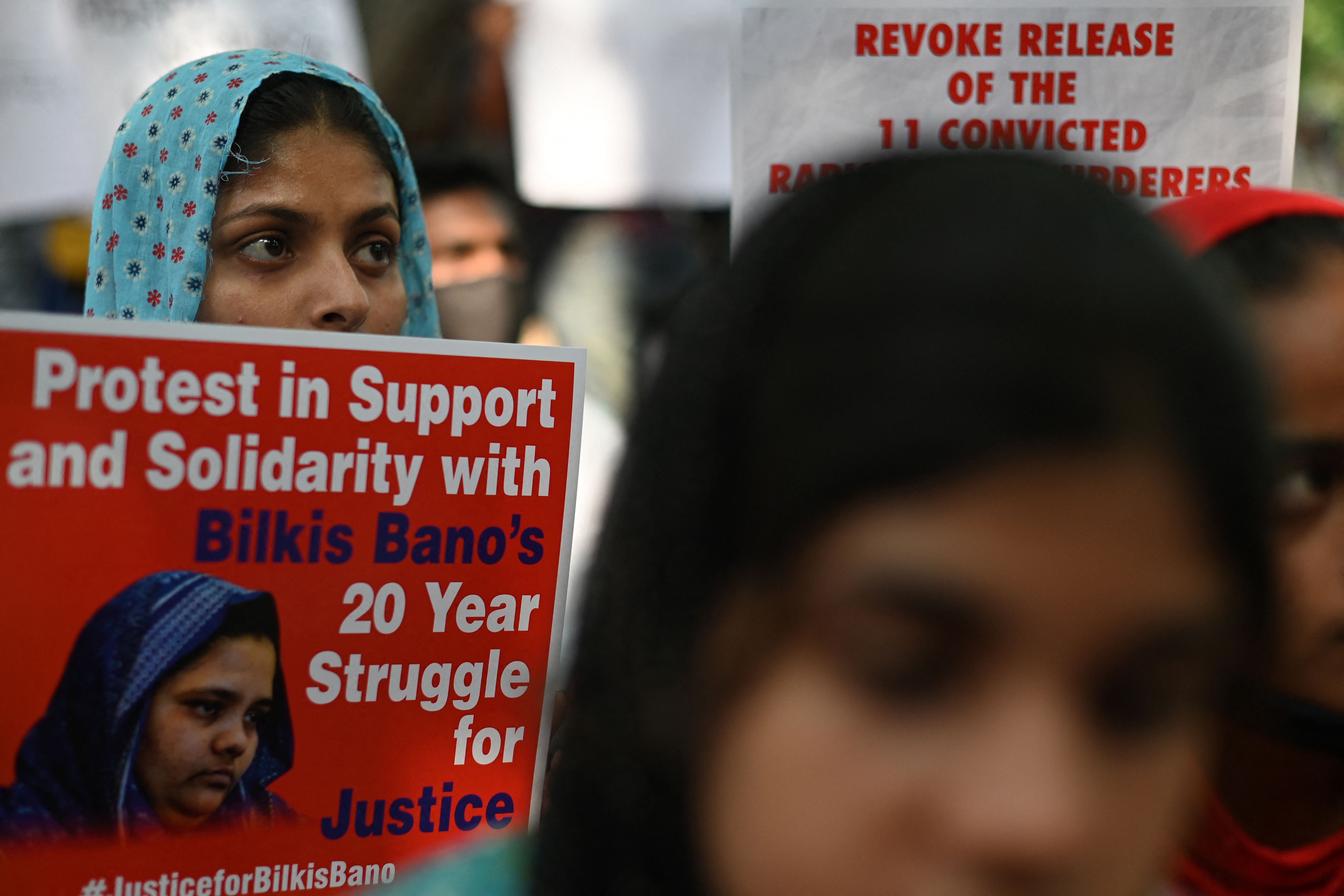Bilkis Bano: Indian gangrape victim challenges release of her 11 rapists in Supreme Court
Convicts were released on 15 August, when India celebrated its 75th anniversary of independence from British rule

Your support helps us to tell the story
From reproductive rights to climate change to Big Tech, The Independent is on the ground when the story is developing. Whether it's investigating the financials of Elon Musk's pro-Trump PAC or producing our latest documentary, 'The A Word', which shines a light on the American women fighting for reproductive rights, we know how important it is to parse out the facts from the messaging.
At such a critical moment in US history, we need reporters on the ground. Your donation allows us to keep sending journalists to speak to both sides of the story.
The Independent is trusted by Americans across the entire political spectrum. And unlike many other quality news outlets, we choose not to lock Americans out of our reporting and analysis with paywalls. We believe quality journalism should be available to everyone, paid for by those who can afford it.
Your support makes all the difference.A Muslim woman in India moved the country’s Supreme Court against the release of 11 men convicted for gangraping her and killing the members of her family during the 2002 Gujarat riots.
The news of the release of men convicted for raping Bilkis Bano came as India celebrated its 75th anniversary of independence from British rule.
Prime minister Narendra Modi’s government drew swift backlash after the Gujarat state government, also ruled by Mr Modi’s Bharatiya Janata Party (BJP), cited approval from the federal government in the premature release of the convicts.
In her plea, filed a day before the Gujarat state election, Ms Bano urged the court to move her challenge to their release to the neighbouring Maharashtra state where the trial took place, instead of in Gujarat.
Ms Bano was 21 years old and five months pregnant when she was gangraped by the convicts during the riots in Gujarat’s Dahod district.
The state was gripped with communal violence after 59 people, mostly volunteers of Hindu organisations, were killed on the Sabarmati Express train when their coach was set on fire at Gujarat’s Godhra station by a suspected Muslim mob.
The incident unleashed violence across the state on an unprecedented scale. While government figures said over 1,000 people were killed in post-Godhra violence, unofficial estimates said over 2,000 people – mostly Muslims – were killed.
Ms Bano had fled her village in the aftermath of the violence with her toddler daughter and 15 others.
On 3 March, the group had taken shelter in a field when a mob of 20-30 people armed with sickles, swords and sticks attacked them.
Ms Bano was gangraped and seven of her family members were killed, while six others had managed to run away. Ms Bano’s three-year-old daughter was one of those killed.
After the incident, Ms Bano approached India’s National Human Rights Commission and a federal probe under the Central Bureau of Investigation (CBI) was ordered subsequently by the Supreme Court.

In 2004, the top court directed the case to be transferred out of Gujarat and to neighbouring Maharashtra after Ms Bano alleged receiving death threats from the accused.
In 2008, a CBI special court convicted 13 accused, sentencing 11 to life imprisonment on the charge of gangrape and murder.
In May 2017, the conviction was upheld by the Bombay High Court.
In 2019, the Supreme Court directed the Gujarat government to pay Rs 5 million (£52,400) as compensation to Ms Bano and provide her a job and a house.
In the days following the release of the convicts, Ms Bano expressed her disappointment with the Indian government and said she is “still numb”.
“Today, I can say only this – how can justice for any woman end like this?” she said in an emotional statement. “When I heard that the 11 convicted men who devastated my family and my life, and took from me my three- year old daughter, had walked free, I was bereft of words. I am still numb.”
Meanwhile, on social media, several images and videos of the convicts being offered sweets and garlanded went viral.
The application for remission of the life sentence for the convicts was considered due to the “completion of 14 years” in jail and other factors like “age, nature of the crime, behaviour in prison and so on”, according to a top Gujarat state government officer.
CK Raulji, a state lawmaker of the ruling BJP who was on the panel that recommended the release of the 11 convicts, referred to the convicts as having “good values” and invoked their caste.
“They [convicts] are Brahmins [upper castes], men of achche sanskaar [good values]. Their conduct in jail was good,” he said in an interview in Hindi to news portal Mojo Story.




Join our commenting forum
Join thought-provoking conversations, follow other Independent readers and see their replies
79Comments